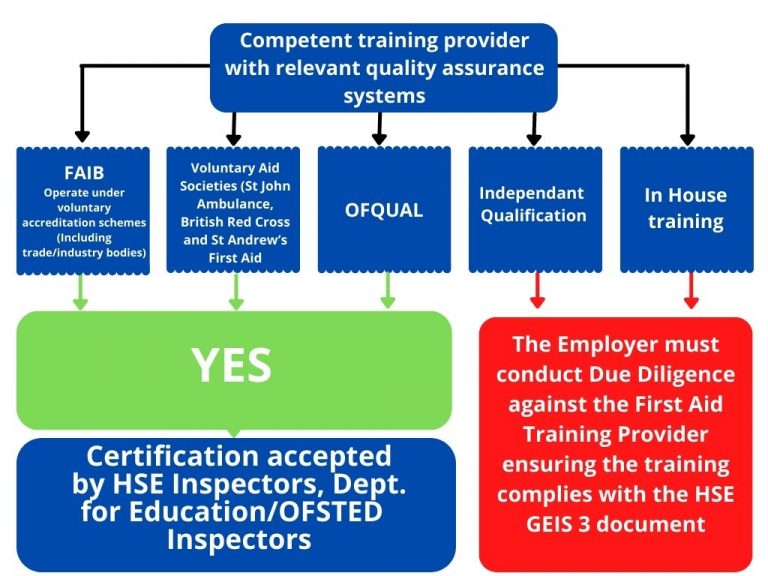Winter brings a unique set of challenges to the workplace, especially here in the UK, where temperatures drop, daylight hours shorten, and icy conditions become more frequent.
For employees working outdoors or in environments exposed to the elements, winter increases the risks of injuries like slips on icy surfaces, cold-related illnesses, and accidents due to reduced visibility.
Creating a safe workplace environment during these colder months requires more than caution—it calls for preparation and knowledge of how to respond when incidents occur.
First Aid at Work Training provides employees with the skills and confidence to manage common winter-related injuries and illnesses.
At Lightning Training Solutions, we offer tailored First Aid at Work courses that equip employees to respond effectively in these situations, helping to keep workplaces safe all season long.
Common Winter Workplace Hazards
Winter introduces several seasonal risks that can impact workplace safety.
Here are some of the most common hazards employees face during the colder months, along with how First Aid at Work training can help manage them.
Slips, Trips, and Falls on Ice and Wet Surfaces
Icy pavements, wet entrances, and slippery car parks can turn even a quick walk into a potential hazard.
In winter, these challenging conditions make slips, trips, and falls more frequent, increasing the risk of sprains, fractures, and even head injuries.
- How First Aid Can Help: First Aid at Work training equips employees to respond quickly to such incidents. With the skills to assess injuries, administer basic care, and determine when emergency assistance is needed, trained employees can provide essential support until further help arrives.

Cold-Related Health Risks (Hypothermia and Frostbite)
Exposure to cold temperatures can lead to hypothermia or frostbite for those who work outside or in unheated environments.
Hypothermia occurs when the body loses heat faster than it can produce it, causing the core body temperature to drop dangerously low. Frostbite, often affecting extremities like fingers, toes, and the nose, results from prolonged exposure to freezing temperatures.
- How First Aid Can Help: First Aid at Work training helps employees recognise the signs of cold-related health issues early. They’ll learn techniques to manage mild cases and take action to prevent severe outcomes while waiting for medical assistance, a critical skill in workplaces where timely help might not always be available.
Seasonal Illnesses (Flu and Respiratory Infections)
The winter months see an increase in flu and other respiratory infections, which can spread quickly in indoor environments. Cold, enclosed spaces, combined with close contact among colleagues, can exacerbate the spread of seasonal illnesses.
- How First Aid Can Help: First Aid at Work training includes guidance on managing symptoms of respiratory illnesses and maintaining hygiene practices. Employees are also trained in minimising cross-infection, which can help reduce the spread of seasonal illnesses in the workplace.

Accidents Due to Limited Daylight
Shorter days mean employees may start or end their shifts in low-light conditions, which can increase the risk of accidents.
Poor visibility is a particular concern for workers on night shifts or those operating heavy machinery, where clear sight is essential for safety.
- How First Aid Can Help: First Aid at Work training prepares employees to handle injuries that can arise from low-visibility conditions. From treating minor cuts and bruises to managing more serious injuries, trained employees can respond swiftly and appropriately in the event of an accident.
How First Aid at Work Training Prepares Employees for Winter Hazards
First Aid at Work training goes beyond basic first aid knowledge; it equips employees with practical skills to handle a range of workplace emergencies, particularly those that arise during winter.
Here’s how our expert training helps staff confidently respond to winter hazards:
Immediate Response Skills
Timing is critical in any emergency.
First Aid at Work training teaches employees to respond promptly and effectively to winter-related incidents, such as falls on ice or exposure to extreme cold.
This includes assessing the situation, ensuring the area is safe, and giving immediate care. A quick response can significantly reduce the severity of injuries and improve recovery outcomes, providing reassurance and safety to colleagues.

Injury Assessment and Care
Our FAW and EFAW training covers essential techniques for accurately assessing injuries. Employees learn how to examine an injured person without causing additional harm, determine the severity of injuries, and administer the appropriate first aid care.
This is especially important for winter-related injuries, such as sprains, fractures, or symptoms of hypothermia, where fast action and proper care can prevent complications.
Using First Aid Equipment Properly
From wound dressings to thermal blankets, First Aid at Work training teaches employees to use the items in a first aid kit effectively, tailored to the specific needs of winter incidents.
For example, thermal blankets can help prevent hypothermia in outdoor work settings, and slings can support injured limbs until professional medical help arrives.
Our training ensures that employees know what tools are available, where to find them, and how to use them confidently in an emergency.
Cold and Shock Management
Cold temperatures and shock can exacerbate injuries, slowing recovery or even leading to complications. First Aid at Work training includes instruction on managing symptoms of shock, which can occur from a severe injury or prolonged exposure to the cold.
Employees learn how to help maintain body temperature and comfort, crucial steps that aid recovery and stabilise the injured person.
By providing staff with these skills, First Aid at Work training fosters a more resilient, prepared workforce equipped to manage and mitigate the unique risks of winter.

Benefits of First Aid at Work Training
First Aid at Work training doesn’t just equip employees to respond to emergencies; it also brings lasting benefits that support a safer, more confident workplace.
Here are some ways that our First Aid training enhances overall winter preparedness:
Boosted Employee Confidence and Morale
When employees know they’re prepared to handle emergencies, they feel more confident in their ability to care for themselves and each other.
This boost in morale can be especially valuable during winter, when icy conditions, cold weather, and other seasonal hazards can increase anxiety about potential injuries. Knowing that trained colleagues are nearby to provide assistance increases reassurance.
Enhanced Workplace Safety Culture
First Aid at Work training encourages a workplace culture that prioritises health and safety, making employees more vigilant and proactive about potential hazards.
Trained employees are more likely to recognise unsafe conditions, such as wet or icy surfaces, and take steps to address them or alert others. This creates a collective commitment to safety that benefits everyone and helps reduce accidents.

Legal Compliance and Reduced Liability
In the UK, employers have a duty to ensure the safety of their workplaces, which includes providing adequate first aid arrangements.
By investing in First Aid at Work training, employers can help meet Health and Safety Executive (HSE) guidelines and demonstrate a commitment to their employees’ welfare.
This training can also reduce liability in case of an accident, as trained employees can provide immediate assistance and potentially prevent injuries from worsening.
Reduced Absences and Faster Recovery
When employees receive timely and effective first aid, they’re more likely to recover quickly and experience less downtime.
In winter, injuries like sprains and fractures from slips can lead to extended absences if not properly managed. With First Aid at Work training, employees receive prompt care that may speed up their recovery time, keeping absences to a minimum and supporting workplace productivity.
Reducing Fire Risks from Temporary Heating Equipment in Winter
During winter, one of the major causes of workplace fires can be the use of temporary heating equipment.
Our Fire Awareness and Fire Marshal courses cover best practices in fire safety, including the proper use of heating devices, emergency protocols, and evacuation procedures to reduce these seasonal risks.
| Available Courses | Cost Per Course |
|---|---|
| Fire Awareness | £360 |
| Fire Marshal | £450 |
Winter First Aid Training at Lightning Training Solutions
To keep employees safe and prepared for winter-specific risks, first aid training is an invaluable investment.
At Lightning Training Solutions, we offer a range of courses designed to equip employees with essential First Aid skills to handle a variety of workplace emergencies, including those that are more common during the colder months.
First Aid at Work Course
Our comprehensive First Aid at Work courses cover topics such as managing injuries from slips, trips, and falls, treating cold-related conditions, and using first aid kits effectively. This course provides employees with in-depth training to handle winter hazards confidently and professionally.
Emergency First Aid at Work Course
For workplaces with lower risks or smaller teams, our Emergency First Aid at Work course is an excellent option. This course focuses on essential skills needed to manage immediate incidents and injuries, with content adapted to seasonal winter risks like hypothermia and slips.
Paediatric First Aid Course
For businesses and organisations that work with children, such as schools or childcare settings, our Paediatric First Aid course provides training specifically designed to address the needs of younger people.
This course is ideal for those in environments where winter hazards might affect children, preparing staff to handle incidents involving minor injuries, cold weather exposure, and more.
Our training sessions are interactive, hands-on, and taught by experienced instructors. Each course is aligned with UK First Aid Standards and provides a solid foundation in practical first aid skills.
First Aid Course Pricing
| Available Courses | Duration | Per Course | Per Person |
|---|---|---|---|
| Health & Safety First Aid at Work | 3 Days | £1,800 | *£180 |
| Health & Safety Emergency First Aid at Work | 1 Day | £700 | *£70 |
| First Aid at Work Re-Qualification Course | 2 Days | £1,200 | *£120 |
| Annual Refresher First Aid at Work Course | ½ Day | £300 | *£30 |
| Emergency Paediatric First Aid | 1 Day | £400 | *£40 |
| Paediatric First Aid | 2 Days | £750 | *£75 |
* Book a full course (12 places) and get 2 places FREE! (prices listed ‘per person’ reflect discount)
Please note: Maximum of 12 people per course. However, we are always happy to accommodate any number of people your business may need to train and prices for fewer numbers of people can be negotiated. Please contact us for details.
All prices are subject to VAT.
Terms and Conditions apply.
Final Thoughts
As winter approaches, now is the ideal time to ensure your team is prepared. Why not visit some of our open courses to explore upcoming dates?
Investing in first aid training now can make all the difference in keeping your employees safe, confident, and ready to handle whatever winter brings.


Pingback: Winter Workplace Hazards and How First Aid at Work Training Can Help | Yeovil Business Support Group
Pingback: Mental Health First Aid and Emergency Helplines - Lightning Training Solutions Blog